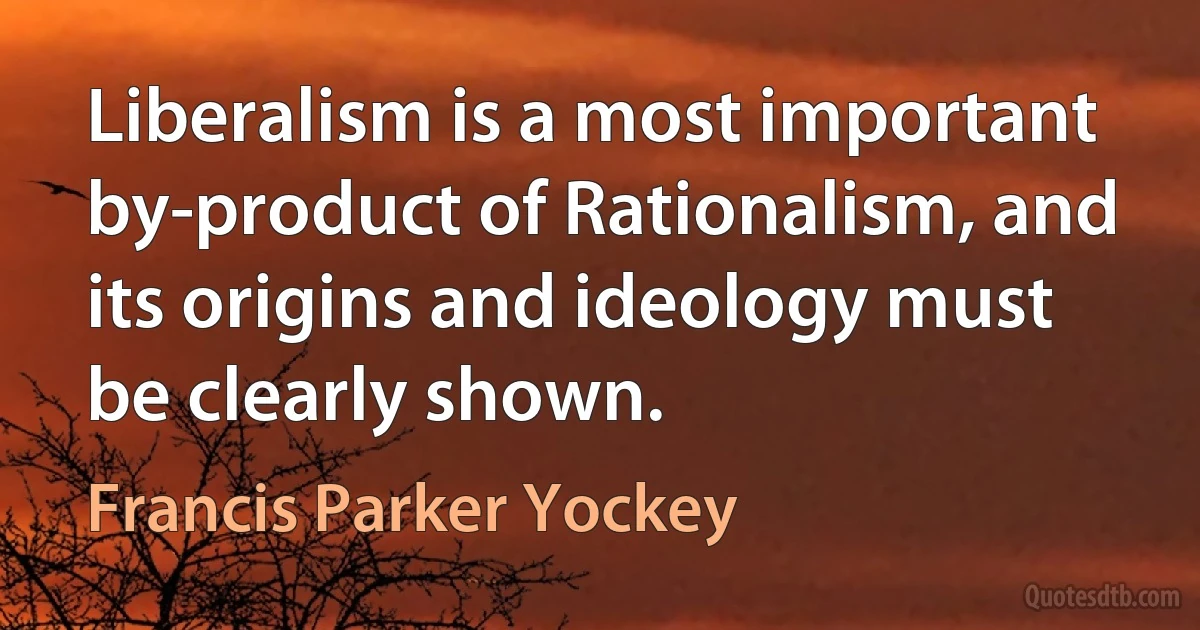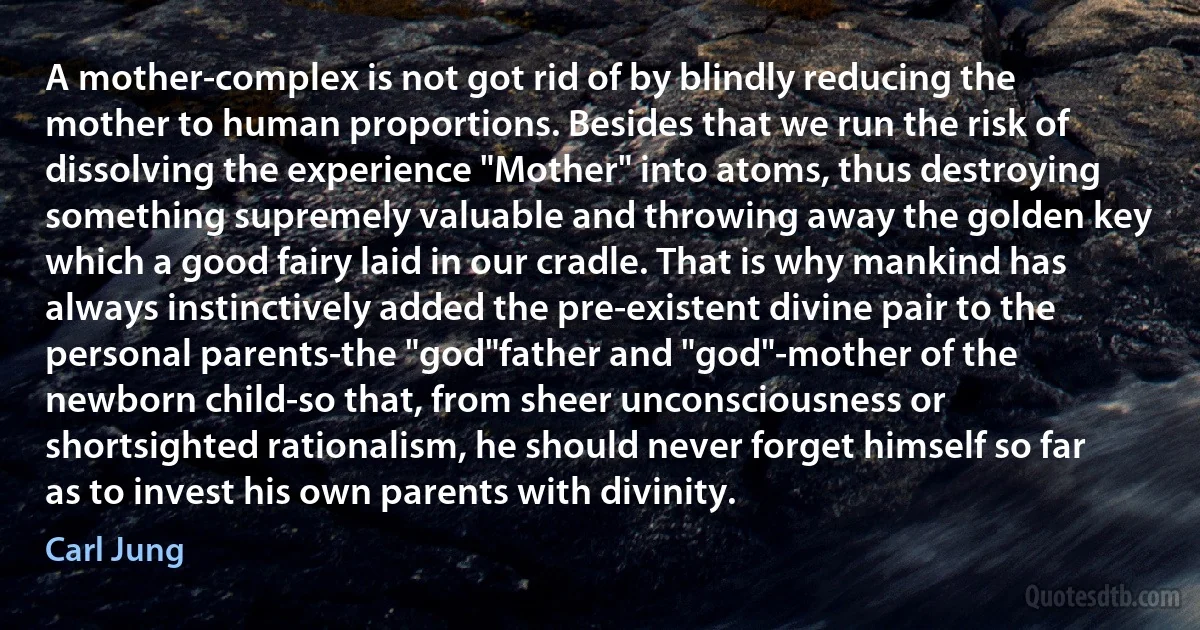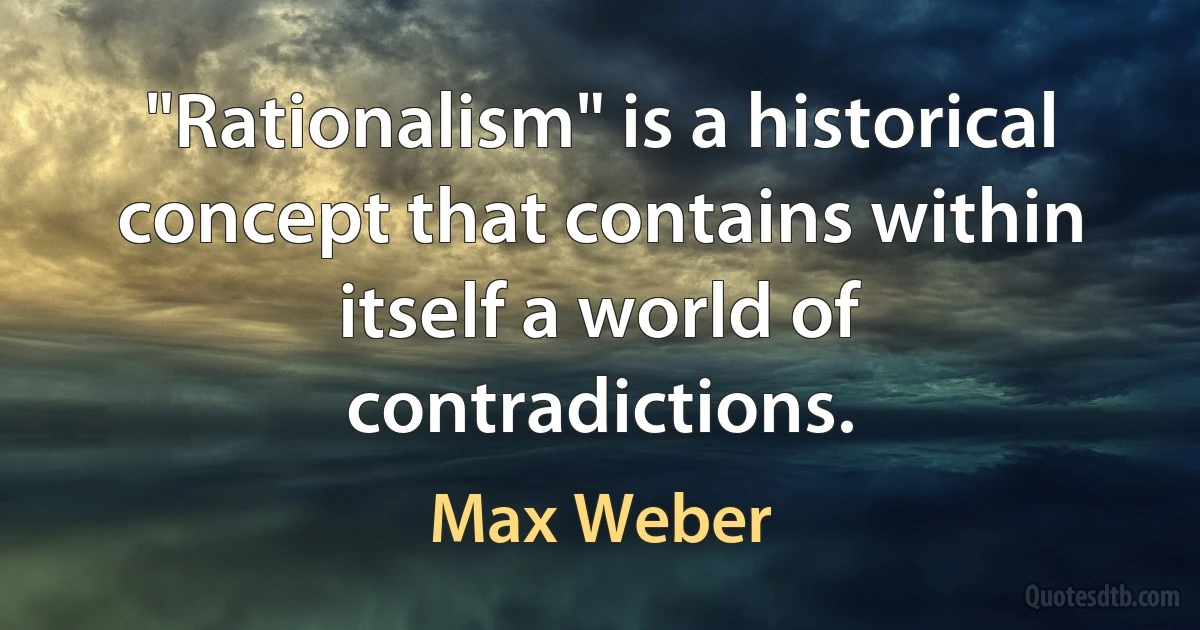Rationalism Quotes - page 2
Say that a thing is so, according to the Pope or the Bible, and it will be dismissed as a superstition without examination. But preface your remark merely with "they say" or "don't you know that?" or try (and fail) to remember the name of some professor mentioned in some newspaper; and the keen rationalism of the modern mind will accept every word you say.

G. K. Chesterton
In a time such as ours when people believe they can do without an ideal, cast away what they call abstract ideas, live on realism, rationalism, positivism, reduce everything to knowledge or to the use of more or less ingenious and casual devices - let us acknowledge it here - in such a time there is only one means of avoiding error, crime, disaster, of determining the conduct to be followed on a given occasion - but a safe means it is, and a fruitful one; this is the exclusive devotion to two abstract notions in the field of ethics: duty and discipline; such a devotion, if it is to lead to happy results, further implies besides... knowledge and reasoning.

Ferdinand Foch
The philosophical thought of Kant, the supreme flower of the Germanic people, has its roots in the religious feeling of Luther, and it is not possible for Kantism, especially the practical part of it, to take root and bring forth flower and fruit in peoples who have not undergone the experience of the Reformation and who perhaps were incapable of experiencing it. Kantism is Protestant, and we Spaniards are fundamentally Catholic. And if Krause struck some roots here - more numerous and more permanent than is commonly supposed - it is because Krause has roots in pietism, and pietism, as Ritschl has demonstrated in his Geschichte des Pietismus, has specifically Catholic roots and may be described as the irruption, or rather the persistence of Catholic mysticism in the heart of Protestant rationalism. And this explains why not a few Catholic thinkers in Spain became followers of Krause.

Miguel de Unamuno
It is the vital asserting itself, and in order to assert itself it creates, with the help of its enemy, the rational, a complete dogmatic structure, and this the Church defends against rationalism, against Protestantism, and against Modernism. The Church defends life. It stood up against Galileo, and it did right; for his discovery, in its inception and until it became assimilated to the general body of human knowledge, tended to shatter the anthropomorphic belief that the universe was created for man. It opposed Darwin, and it did right, for Darwinism tends to shatter our belief that man is an exceptional animal, created expressly to be eternalized. And lastly, Pius IX, the first Pontiff to be proclaimed infallible, declared he was irreconcilable with the so-called modern civilization. And he did right.

Miguel de Unamuno
In the last centuries of the empire, educational standards and literacy had fallen. In the dulled heads of the masses, distracted by cheap food and the barbaric spectacles of the coliseums, the values on which Rome had been founded and the ancient rationalism of the Greeks had been replaced by mysticism and superstition. It was-Honorius had explained to his pupil-as if a whole culture was losing its mind. People were forgetting how to think, and soon they would forget they had forgotten. And, to Honorius's thinking, Christianity only exacerbated that problem.
"You know, Augustine warned us that belief in the old myths was fading-even a century and a half ago, as the dogma of the Christians took root. And with the loss of the myths, so vanishes the learning of a thousand years, which are codified in those myths, and the monolithic dogmas of the Church will snuff out rational inquiry for ten more centuries. The light is fading, Athalric.”.

Stephen Baxter
The eighteenth century is full of contradictions. It is not only that its philosophical attitude wavers between rationalism and anti-rationalism, but its artistic aims are also dominated by two 122 opposite tendencies and at some times approach a strictly classicistic, at others a more unrestrained pictorial conception. And like the rationalism of the period, its classicism is also difficult to define and open to various sociological interpretations, since it is sustained alternately by courtly-aristocratic and middle-class strata of society and ends by developing into the representative artistic style of the revolutionary bourgeoisie.

Arnold Hauser
Perhaps the greatest change that industrialism (along with Protestantism and rationalism) has made in daily life is to separate work from leisure in a radical and almost absolute way. Once the efficacy of work began to be more clearly and fully appreciated, work had to become more efficacious in itself - that is, more efficient. To this end, it had to be more sharply separated from everything that was not work; it had to be made more concentratedly and purely itself - in attitude, in method and, above all, in time. Moreover, under the rule of efficiency, seriously purposeful activity in general tended to become assimilated to work. The effect of all this has been to reduce leisure to an occasion more exclusively of passivity, to a breathing spell and interlude; it has become something peripheral.

Clement Greenberg
Dostoevsky believed that the gods of rationalism and materialist utilitarianism had joined in conspiracy against all other ethical systems. ... The accumulation of capital, or the acquisition of money, are endeavors par excellence which establish a quantifiable goal: hence they are directly amenable to maximization formulae.

John Carroll
Logical empiricism holds the view, notwithstanding some its assertions, that the forms of knowledge and consequently the relations of man to nature and to other men never change. According to rationalism, too, all subjective and objective potentialities are rooted in insights which the individual already possesses, but rationality uses existing objects as well as the active inner striving and ideas of man to construct standards for the future. In this regard, it is not so closely associated with the present order as is empiricism.

Max Horkheimer
Pantheism makes God into a present, real, and material being; empiricism – to which rationalism also belongs – makes God into an absent, remote, unreal, and negative being. Empiricism does not deny God existence, but denies him all positive determinations, because their content is supposed to be only finite and empirical; the infinite cannot, therefore, be an object for man. But the more determinations I deny to a being, the more do I cut it of[ from myself, and the less power and influence do I concede to it over me, the freer do I make myself of it. The more qualities I possess, the more I am for others, and the greater is the extent of my influence and effects. And the more one is, the more one is known to others. Hence, each negation of an attribute of God is a partial atheism, a sphere of godlessness.

Ludwig Andreas Feuerbach
Both as ruling and ruled strata and both as a majority and minority, Protestants... have demonstrated a specific tendency toward economic rationalism. This tendency has not been observed in the same way in the present or the past among Catholics, regardless of whether they were the dominant or dominated stratum or constituted a majority or minority. Therefore the cause of the different behavior must be mainly sought in the enduring inner quality of these religions and not only in their respective historical-political external situations.

Max Weber
By a pardonable abridgment of history, the Rationalist character may be seen springing from the exaggeration of Bacon's hopes and the neglect of the scepticism of Descartes; modern Rationalism is what commonplace minds made out of the inspiration of men of discrimination and genius.

Michael Oakeshott
Rationalism in politics, as I have interpreted it, involves an identifiable error, a misconception with regard to the nature of human knowledge, which amounts to a corruption of the mind. And consequently it is without the power to correct its own short-comings; it has no homeopathic quality; you cannot escape its errors by becoming more sincerely or more profoundly rationalistic.

Michael Oakeshott



